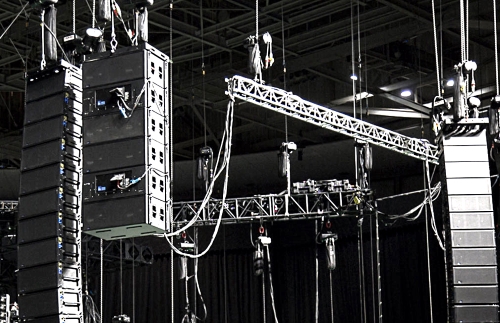Community, Leadership, Experimentation, Diversity, & Education
Pittsburgh Arts, Regional Theatre, New Work, Producing, Copyright, Labor Unions,
New Products, Coping Skills, J-O-Bs...
Theatre industry news, University & School of Drama Announcements, plus occasional course support for
Carnegie Mellon School of Drama Faculty, Staff, Students, and Alumni.
CMU School of Drama
Thursday, September 26, 2019
Defying Gravity…Safely: Approaches And Best Practices In Flying Loudspeakers
ProSoundWeb: Some in audio think that the term “rigging” only applies when loudspeakers are flown, but it also pertains to lesser endeavors such as placing a single loudspeaker on a tripod stand. The bottom line is that for any piece of production gear not sitting directly on the ground, steps must be in place to insure that it does not fall and injure someone (or worse).
Subscribe to:
Post Comments (Atom)

2 comments:
I feel like the riggin of things like sound equipment and even more so projectors are some of the things that get overlooked most often in theatrical rigging. I am almost always comfortable with scenery that has been rigged, because I know that the people who did that do it all the time and know what they are doing and how to do it properly. Of course that is a generalization that might not always hold true, but for the most part, I feel like it does. When it comes to sound and media people, rigging is something they do not do very often or in any large applications, and it can be overlooked or not even considered rigging by the untrained person. But these rigged items are clearly just as dangerous as anything scenic related, and even more so when considering the audience because they are usually rigged above the house. It would not be a crazy idea to require media and sound engineers and even master electricians to have the same kind of rigging certification that a scenic rigger would be required.
This is a good article to remind anyone who has to put anything above actors or audience members heads, that they need to take the time to do this safely. I agree with Cooper that master electricians and audio engineers should have the same training as scenic riggers. To me, that makes a lot of sense. At the least, like the article says, they should at least be ‘competent’ enough to set the rigging system up. If they are not qualified, by definition of the article, to design the system, maybe that still comes from scenic riggers. It may sound sort of ‘hokey’ and ‘feel good’, but we are all a team and one department lacking in a skill should not mean no one takes responsibility. We are all working together, and should help out when we can. If you see something that is not safe, say something. Fix it, or find someone to fix it.
Post a Comment